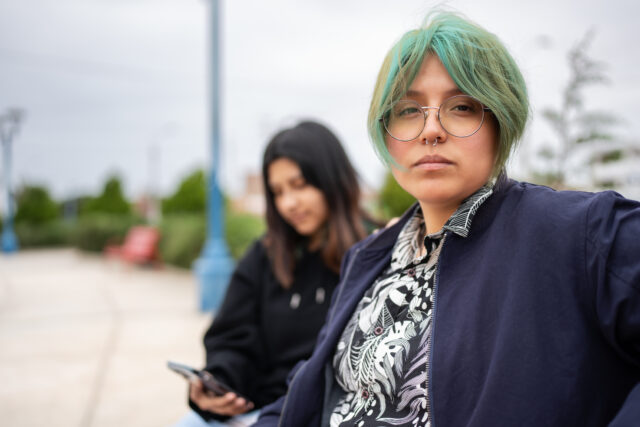It’s easy to react in the heat of the moment, but that often leads to regret, misunderstandings, or unnecessary stress.

Learning to respond instead of reacting gives you more control over your emotions and decisions. That’s not to say you should be suppressing your feelings in any way. Instead, it’s more about giving yourself the space to handle situations with clarity. Here’s how to nip those knee-jerk reactions in the bud and get more control over the way you respond to people and situations.
1. Take a minute before saying anything.

When emotions run high, your first instinct might be to react immediately, but taking even a few seconds to pause can make all the difference. That brief moment allows your brain to catch up with your emotions, giving you time to process what’s actually happening. Taking a breath (or three!) shouldn’t lead to ignoring your feelings; it just stops you from saying something you might regret. A short moment of silence can help you regain control and choose your words more carefully. It’s a simple but powerful way to prevent knee-jerk reactions.
2. Breathe to regain focus.

Deep breathing is one of the quickest ways to calm yourself down when you feel triggered. A few slow breaths help lower stress levels and stop your emotions from taking over. It shifts your body out of a fight-or-flight state and gives you a moment to think clearly. Focusing on your breath creates space between the situation and your response. It’s a way to ground yourself before speaking or making a decision. When you take control of your breathing, you take control of your reaction.
3. Ask yourself if it really needs a response.

Not everything requires an immediate reaction, and sometimes, it doesn’t need one at all. Before responding, ask yourself if engaging in the situation will actually make a difference. Some things are better left alone, especially if they only drain your energy. If it’s a minor irritation or someone trying to provoke you, stepping back might be the best option. Choosing not to react isn’t the same as avoiding a problem — it’s deciding what’s worth your time and energy. Sometimes, the best response is no response at all.
4. Consider how you’ll feel about it later.

In the moment, things can feel bigger than they actually are. But will this situation matter in a few hours, days, or weeks? Asking yourself this question helps put things into perspective and prevents emotional overreactions. Taking a step back to see the bigger picture makes it easier to respond thoughtfully. When you realise that a situation is temporary, you’re less likely to let it control your emotions. Perspective is a powerful tool for responding with intention instead of reacting on impulse.
5. Recognise your emotional triggers.
 Source: Unsplash
Source: Unsplash We all have certain things that set us off—whether it’s a particular tone of voice, a past experience, or specific words. Understanding your triggers helps you separate your emotions from the actual situation. The more aware you are of what affects you, the better you can control your response. Instead of reacting blindly, you can acknowledge what’s happening internally. Recognising a trigger isn’t the same as ignoring it; it means taking ownership of your emotions. Once you know what sets you off, you can work on responding in a way that serves you better.
6. Delay tough conversations, at least for a little while.

When emotions are high, it’s rarely the best time to have an important conversation. Instead of diving into a discussion when you’re upset, give yourself time to cool down. A short break can prevent unnecessary conflict and lead to a more productive conversation. Letting emotions settle allows you to approach things with a clearer mindset. It also helps you express yourself in a way that’s more likely to be heard. Difficult conversations are easier to navigate when they happen from a place of calm rather than frustration.
7. Reframe the situation.

How you interpret a situation affects how you respond to it. Instead of seeing something as an attack or an insult, try looking at it from another angle. Maybe the other person is having a bad day, or perhaps their words weren’t meant the way they sounded. Reframing isn’t the same as excusing bad behaviour; it just helps you respond with more perspective. When you shift how you see the situation, you gain more control over how you react to it. A different perspective can stop emotions from escalating unnecessarily.
8. Focus on what you can control.

Not every situation is within your power to change, but you always control your response. Getting caught up in what someone else says or does only drains your energy. Redirecting your focus to your own actions and mindset helps you stay in control. Instead of reacting to things outside your influence, shift your attention to how you handle them. Choosing to respond calmly gives you a sense of power, even in tough situations. The more you focus on what’s within your control, the less external factors will dictate your emotions.
9. Do more active listening.
 Source: Unsplash
Source: Unsplash Sometimes, we react emotionally because we aren’t fully listening to what’s being said. Instead of assuming or preparing a response in your head, focus on actually hearing the other person. Slowing down and listening carefully prevents misunderstandings. Active listening helps you respond more thoughtfully instead of jumping to conclusions. When you take the time to understand, you’re less likely to react defensively. The better you listen, the more measured your response will be.
10. Stop personalising everything.
 Source: Unsplash
Source: Unsplash Not everything is about you, even if it feels that way. Sometimes, people’s words or actions come from their own stress, insecurities, or problems. Learning not to take things personally prevents unnecessary emotional reactions. Instead of assuming an offhand comment is a direct attack, consider whether it’s really about you. Distancing yourself from other people’s emotions allows you to respond with less defensiveness. Taking things less personally makes it easier to stay calm and objective.
11. Set boundaries for your emotional energy.
 Source: Unsplash
Source: Unsplash Not every situation deserves your emotional investment. If something consistently upsets you, it might be time to set boundaries around it. Protecting your mental space helps you respond with clarity instead of reacting out of frustration. Setting boundaries doesn’t mean ignoring problems — it’s about knowing what you will and won’t tolerate. When you establish emotional limits, you respond from a place of self-respect rather than exhaustion. Clear boundaries make it easier to navigate challenges without unnecessary emotional strain.
12. Avoid reacting when you’re tired or stressed.
 Source: Unsplash
Source: Unsplash Exhaustion and stress make emotional reactions more intense. When you’re running on empty, small things feel bigger, and patience wears thin. Recognising when you’re in this state helps you avoid unnecessary conflicts. If you’re feeling overwhelmed, give yourself permission to step back before responding. Taking a break can prevent saying or doing something you’ll later regret. Being aware of your emotional state allows you to handle situations more rationally.
13. Use humour to lighten the situation.
 Source: Unsplash
Source: Unsplash Not every situation has to be met with seriousness. Sometimes, taking a step back and adding a bit of humour can break the tension. A light-hearted approach can shift the energy and make it easier to respond calmly. Humour isn’t a substitute for overlooking tough situations; it’s about choosing not to let small things ruin your mood. A well-placed joke or seeing the absurdity in a situation can stop emotions from spiralling. Responding with lightness can defuse unnecessary tension.
14. Remind yourself that silence is an option.
 Source: Unsplash
Source: Unsplash Not everything requires an immediate response. Sometimes, silence is the most powerful way to handle a situation. Choosing not to react gives you the space to process things without unnecessary conflict. Holding back doesn’t mean you’re avoiding an issue; it means you’re choosing your response wisely. Taking time to reflect before speaking can prevent regret and lead to better outcomes. Sometimes, saying nothing at all is the best way to maintain peace.
15. Respond in a way that reflects who you want to be.
 Source: Unsplash
Source: Unsplash Your response in difficult situations shapes your character over time. When faced with a challenge, ask yourself how the best version of you would handle it. Responding with intention rather than reacting emotionally keeps you in alignment with your values. Every response is an opportunity to show patience, understanding, and self-control. Choosing your words and actions carefully strengthens your relationships and personal growth. The more you practice responding instead of reacting, the more empowered you become in handling life’s challenges.




